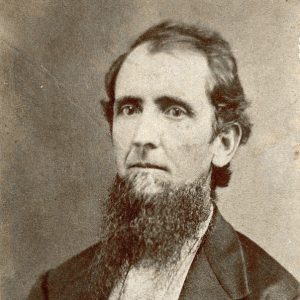calsfoundation@cals.org
Rufus King Garland (1830–1886)
Rufus King Garland was a prominent Arkansas politician who voted for secession and briefly held the rank of captain in the Confederate army. He turned against the war by 1863, won election to the Confederate Congress, and became one of President Jefferson Davis’s most vocal critics. After the war, Garland remained active in politics and unsuccessfully ran for governor in 1882.
Rufus King Garland was born on May 22, 1830, in Tipton County, Tennessee, to Rufus Garland and Barbara Hill Garland; he had one brother and one sister. He was raised in Washington (Hempstead County) and educated at St. Joseph’s College in Bardstown, Kentucky. On February 22, 1853, he married Isabella Sarah Walker, who was the daughter of prominent doctor J. H. Walker of Hempstead County, Arkansas. Garland and his wife did not have any children. His younger brother Augustus Hill Garland was also a prominent politician, serving in the Confederate Congress (1862–1865), as the governor of Arkansas (1874–1877), and as the United States attorney general (1885–1889).
In 1858, Rufus King Garland was elected to the Arkansas General Assembly. Initially a member of the Whig Party and strong supporter of the Union, Garland joined the Democratic Party and began supporting secession after President Abraham Lincoln called for troops on April 15, 1861, to suppress the rebellion. On May 6, 1861, Garland signed Arkansas’s secession ordinance.
After voting in favor of secession, Garland resigned his seat in the state legislature. He helped raise troops for the Confederacy and became the commander of Company B in the Fourth Arkansas Infantry. However, it is unclear how much active service Garland performed. His military records include a letter dated June 5, 1862, from Garland to General Earl Van Dorn in which Garland claimed that members of the Fourth Arkansas elected him a captain against his will and that he refused the commission. Another note in his file states that Garland served as a captain in the Fourth Arkansas from August 17, 1861, to February 28, 1862, and that “the rolls do not show how he [Garland] got out of the service.” Regardless of the exact nature of Garland’s military service, by the fall of Vicksburg and Port Hudson in July 1863, Garland had become disillusioned with the Confederate war effort and returned to politics.
In 1863, Garland announced his candidacy for the Confederate Congress in Arkansas’s second district. He won the race, defeating incumbent Confederate congressman Grandison Delaney Royston. Garland may have defeated Royston at least in part because Royston was embroiled in a scandal—critics argued that he supported stricter conscription laws while also securing an exemption for his own son.
Garland served in the Confederate Congress for the remainder of the war. In the Confederate Congress, Garland was a vocal critic of Jefferson Davis and of Davis’s handling of the military. Although Garland generally opposed the expansion of the Confederate government’s power, he made an exception for any bill he felt would help soldiers. On February 22, 1865, he shocked many of his constituents when he voted to double Confederate taxes on agricultural products.
After the Civil War ended in 1865, Garland returned to his family’s farm near Prairie D’Ane (located in what is now Nevada County). In 1874, Garland served as a delegate to the Arkansas Constitutional Convention. Garland left the Democratic Party in 1879 and joined the Greenback Movement. In 1882, he ran for governor of Arkansas but lost to Democrat James Henderson Berry.
Garland died on December 12, 1886, at his home. The local newspaper reported that the death came as a shock to the community, as Garland was only fifty-six years old and had been sick with cerebral meningitis for only a few days before he died. He is buried in Prescott (Nevada County). He was survived by his wife, who died in 1925.
For additional information:
“Death of Hon. R. K. Garland.” Nevada County Picayune, December 15, 1886, p. 3.
“Hon. G. D. Royston.” True Democrat, July 8, 1863, p. 2.
“Rufus K. Garland.” Compiled Service Records of Confederate Soldiers from Arkansas. National Archives and Records Administration.
Warner, Ezra J., and W. Buck Yearns. Biographical Register of the Confederate Congress. Baton Rouge: Louisiana State University Press, 1975.
Christopher Thrasher
Fayetteville Technical Community College
 Civil War through Reconstruction, 1861 through 1874
Civil War through Reconstruction, 1861 through 1874 Politics and Government
Politics and Government Rufus King Garland
Rufus King Garland 



Comments
No comments on this entry yet.